广州版小学六年级英语一般将来时.doc
广州版小学英语六年级下册要点、目标与词组
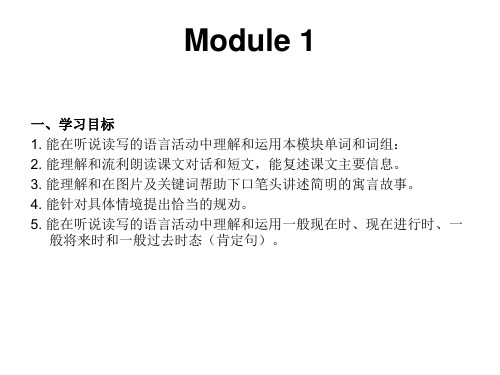
二、知识要点
(1) 动物名称:frog, kangaroo, starfish, panda, elephant, lion, tiger, whale (2)If 与may形成的描述可能的行为后果的句子。如: If we cut down the trees, the animals may lose their home. If we don’t do something now, they may all disappear forever! (3) 用祈使句表示倡议。如: Never buy things made from animals in danger. Plant trees and don’t pollute. (4)一般现在时、现在进行时、一般将来时和一般过去时态的否定陈述句 (复习运用):见课本第19页
(2) 用祈使句和should等表示规劝。 Don’t be proud. Be patient. Don’t cut so fast. If you want to do something well, you should work harder. (3)一般现在时、现在进行时、一般将来时和一般过去时态的肯定陈述句(复习运用): 见课本第7页
(4)过去进行时 用来讲述过去某个时间正在发生的事情。将现在进行时中的be动词(am, is, are)变为was, were就构成过去进行时了。如: One day a farmer was working in the field. 一天,一个农夫正在地里干 活儿。 Jack was feeding the dog when his father got home. 杰克的爸爸回到 家的时候他正在给狗狗喂食。 I was driving when you called. 你打电话来的时候我在开车。 (5) 反身代词
用一般将来时写一篇作文英语六年级

用一般将来时写一篇作文英语六年级English: In the future, I will become a doctor and help people whoare sick. I will study hard in school to learn everything I need to know to become a good doctor. I will also learn about different diseases and how to treat them. When I grow up, I will work in a hospital and take care of patients. I will be kind and caring, always listening to their concerns and making them feel better. I will work long hours, but I know that it will be worth it to see my patients healthy and happy. I will be proud to be a doctor and make a difference in people's lives.中文翻译: 在将来,我会成为一名医生,并帮助那些生病的人。
我会努力在学校学习,以了解成为一名优秀医生所需的一切知识。
我也会学习不同的疾病以及如何治疗它们。
长大后,我会在医院工作并照顾病人。
我会善良和关爱,时刻倾听他们的烦恼并让他们感觉更好。
我会工作很长时间,但我知道,看到我的病人健康快乐是值得的。
成为一名医生让我感到自豪,并让我在人们的生活中有所作为。
六年级英语一般将来时讲解加练习
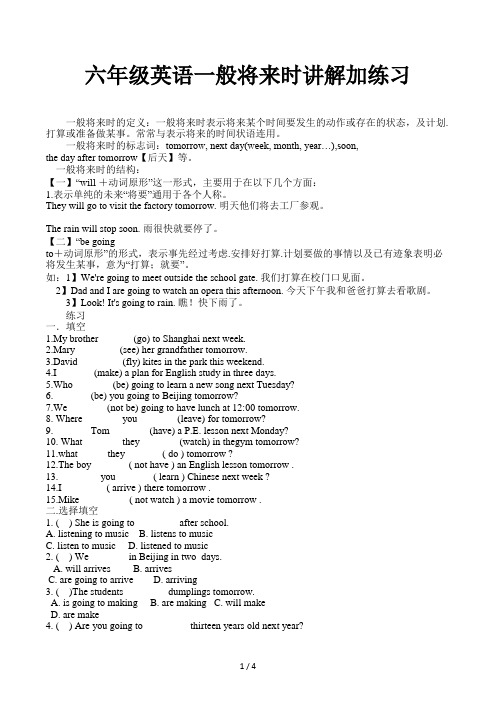
六年级英语一般将来时讲解加练习一般将来时的定义:一般将来时表示将来某个时间要发生的动作或存在的状态,及计划.打算或准备做某事。
常常与表示将来的时间状语连用。
一般将来时的标志词:tomorrow, next day(week, month, year…),soon,the day after tomorrow【后天】等。
一般将来时的结构:【一】“will +动词原形”这一形式,主要用于在以下几个方面:1.表示单纯的未来“将要”通用于各个人称。
They will go to visit the factory tomorrow. 明天他们将去工厂参观。
The rain will stop soon. 雨很快就要停了。
【二】“be goingto+动词原形”的形式,表示事先经过考虑.安排好打算.计划要做的事情以及已有迹象表明必将发生某事,意为“打算;就要”。
如:1】We're going to meet outside the school gate. 我们打算在校门口见面。
2】Dad and I are going to watch an opera this afternoon. 今天下午我和爸爸打算去看歌剧。
3】Look! It's going to rain. 瞧!快下雨了。
练习一.填空1.My brother ______ (go) to Shanghai next week.2.Mary ________ (see) her grandfather tomorrow.3.David ________ (fly) kites in the park this weekend.4.I_______ (make) a plan for English study in three days.5.Who _______ (be) going to learn a new song next Tuesday?6._______ (be) you going to Beijing tomorrow?7.We _______ (not be) going to have lunch at 12:00 tomorrow.8. Where _______ you _______ (leave) for tomorrow?9._______ Tom _______ (have) a P.E. lesson next Monday?10. What _______ they _______ (watch) in thegym tomorrow?11.what _____ they _______( do ) tomorrow ?12.The boy _______( not have ) an English lesson tomorrow .13.________ you _______( learn ) Chinese next week ?14.I ________ ( arrive ) there tomorrow .15.Mike _________ ( not watch ) a movie tomorrow .二.选择填空1. ( ) She is going to ________ after school.A. listening to musicB. listens to musicC. listen to musicD. listened to music2. ( ) We _______ in Beijing in two days.A. will arrivesB. arrivesC. are going to arriveD. arriving3. ( )The students ________ dumplings tomorrow.A. is going to makingB. are makingC. will makeD. are make4. ( ) Are you going to_________ thirteen years old next year?A. will beB. areC. beD. go5. ( ) ___will see a play in 5 days?A. WhenB. WhatC. WhoD. Whose6. ( ) Mary______ English next year.A. will learnB. will to learnC. are going to learn.D. learns7. ( ) He’ll _____ shopping this afternoon.A. goingB. goC. goesD. went8. ( ) Will you ____ at the bus stop at 10:30?A. meetingB. meetsC. meetD. met9. ( ) Lily and I _______ the guitar. next week.A. am going to playB. are going to playC. will playsD. play10. ( ) How ______ Jenny ___ home tomorrow?A. does......goB. is……goingC. will……goD. do……g o11. ( ) Who is going to _________ a song ?A. sings B singing C. to sing D. sing12. ( ) I _________in Beijing in three days.A. are going to arriveB. arriveC. will arriveD. arrives13. ( ) He _______some model planes tomorrow .A. going to makeB. is makingC. will make D makes14. ( ) Are you going to ___________a doctor next year ?A. will beB.. areC. beD. are going to15. ( ) She ________ you make supper this evening .A. helpsB. will helpC. is helpingD. is going help三.把下列句子变成一般疑问句,并给出肯定和否定回答。
小学六年级英语一般将来时四个句型
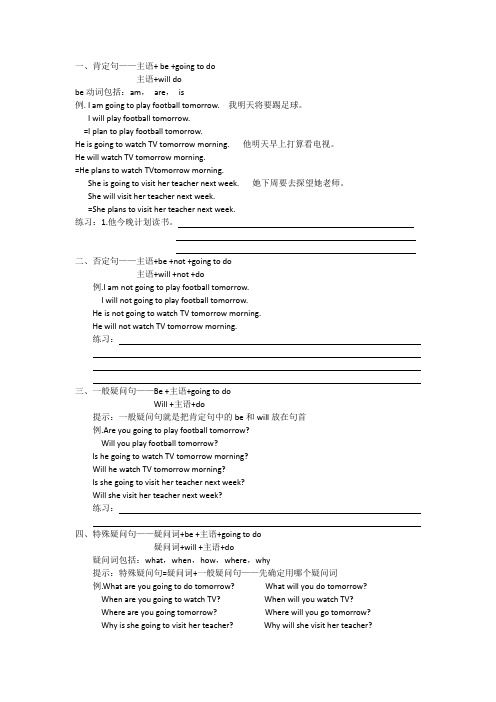
一、肯定句——主语+ be +going to do主语+will dobe动词包括:am,are,is例. I am going to play football tomorrow. 我明天将要踢足球。
I will play football tomorrow.=I plan to play football tomorrow.He is going to watch TV tomorrow morning. 他明天早上打算看电视。
He will watch TV tomorrow morning.=He plans to watch TVtomorrow morning.She is going to visit her teacher next week. 她下周要去探望她老师。
She will visit her teacher next week.=She plans to visit her teacher next week.练习:1.他今晚计划读书。
二、否定句——主语+be +not +going to do主语+will +not +do例.I am not going to play football tomorrow.I will not going to play football tomorrow.He is not going to watch TV tomorrow morning.He will not watch TV tomorrow morning.练习:三、一般疑问句——Be +主语+going to doWill +主语+do提示:一般疑问句就是把肯定句中的be和will放在句首例.Are you going to play football tomorrow?Will you play football tomorrow?Is he going to watch TV tomorrow morning?Will he watch TV tomorrow morning?Is she going to visit her teacher next week?Will she visit her teacher next week?练习:四、特殊疑问句——疑问词+be +主语+going to do疑问词+will +主语+do疑问词包括:what,when,how,where,why提示:特殊疑问句=疑问词+一般疑问句——先确定用哪个疑问词例.What are you going to do tomorrow? What will you do tomorrow?When are you going to watch TV? When will you watch TV?Where are you going tomorrow? Where will you go tomorrow?Why is she going to visit her teacher? Why will she visit her teacher?。
小学英语六年级下册总复习《一般将来时 》课件

一般情况,一般将来时的对划线部分有三种 情况。 1. 问人。Who 例如:I’m going to New York soon. →Who’s going to New York soon. 2. 问干什么。What … do. 例如: My father is going to watch a race with me this afternoon. →What is your father going to do with you this afternoon. 3. 问什么时候。When. 例如:She’s going to go to bed at nine. →When is she going to bed?
一般疑问句
be或will提到句首,some改为any, and改为 or,第一二人称互换。 例如:We are going to go on an outing this weekend. → Are you going to go on an outing this weekend?
对划线部分提问
一般将来时
一般将来时的意义: 表示将要…..,将会做….,打算去做….. 如:它将要下雨了。 我打算去买一本书。 我们明天将会去中山公园。
提示动词
句中一般有以下时间状语:tomorrow, next day(week, month, year…),soon, the day after tomorrow(后天)
( B ) 8. – Will his parents go to see the movie tomorrow? – No, ________ (不去). A. they willn’t. B. they won’t. C. they aren’t. D. they don’t. ( B ) 9. We ________ the work this way next time. A. do B. will do C. going to do D. will doing
语法专题复习四大时态(讲义)粤人版英语六年级下册
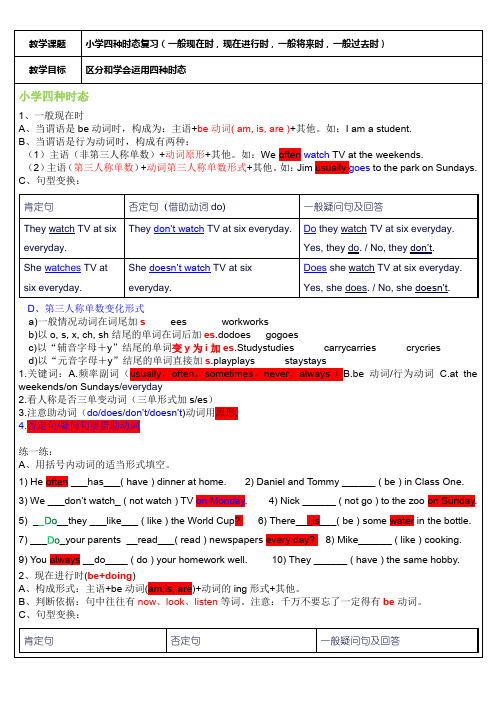
2.以不发音的e结尾,去e加ing,如:makemaking, tastetasting
3.如果末尾是一个元音字母和一个辅音字母,双写末尾的辅音字母,再加ing,如:runrunning, stopstopping
1.关键词now现在、look看、listen听/be doing
d)以“元音字母+y”结尾的单词直接加s.playplays staystays
1.关键词:A.频率副词(usually,often,sometimes,never,always)B.be动词/行为动词C.at the weekends/on Sundays/everyday
2.看人称是否三单变动词(三单形式加s/es)
肯定句
否定句
一般疑问句及回答
She is going to have a picnic tomorrow.
She isn’t going to have a picnic tomorrow.
Is she going to have a picnic tomorrow?
Yes, she is. / No, she isn’t.
A.learn B. learns C. learning
( ) 4.she ________ dancing now.
A isB areC am
( )5. Look! the rabbit is ________.
A .jumping B. jump C. jumps
3、一般过去时(ed)
A、构成形式:主语+动词的过去式+其他。
练一练:
A、用动词的适当形式填空。
1) It_____( be ) Ben’s birthday last Friday. 2) We all_____ ( have ) a good time last night.
广州民校联考小学六年级英语四种时态综合练习 (2)
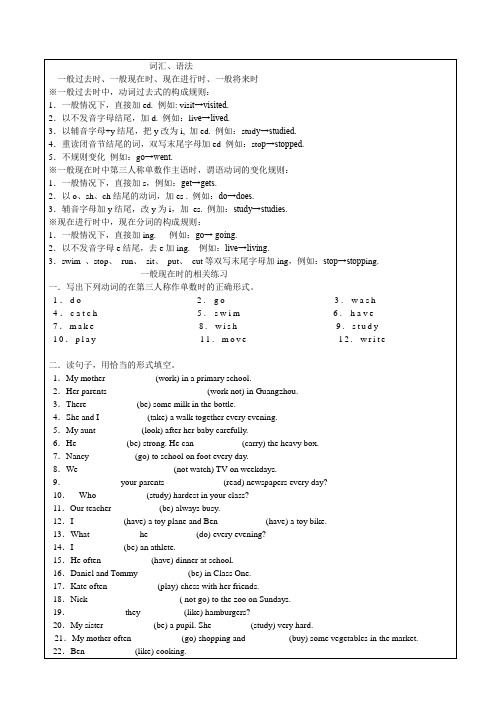
词汇、语法一般过去时、一般现在时、现在进行时、一般将来时※一般过去时中,动词过去式的构成规则:1.一般情况下,直接加ed. 例如: visi t→visited.2.以不发音字母结尾,加d. 例如:liv e→lived.3.以辅音字母+y结尾,把y改为i, 加ed. 例如:stud y→studied.4.重读闭音节结尾的词,双写末尾字母加ed 例如:sto p→stopped.5.不规则变化例如:g o→went.※一般现在时中第三人称单数作主语时,谓语动词的变化规则:1.一般情况下,直接加s,例如:get→gets.2.以o、sh、ch结尾的动词,加es . 例如:do→does.3.辅音字母加y结尾,改y为i,加es. 例加:study→studies.※现在进行时中,现在分词的构成规则:1.一般情况下,直接加ing. 例如:go→ going.2.以不发音字母e结尾,去e加ing. 例如:live→living.3.swim 、stop、run、sit、put、cut等双写末尾字母加ing,例如:stop→stopp ing.一般现在时的相关练习一.写出下列动词的在第三人称作单数时的正确形式。
1.d o___________ 2.g o___________ 3.w a s h___________ 4.c a t c h___________ 5.s w i m___________ 6.h a v e___________ 7.m a k e___________8.w i s h___________9.s t u d y___________ 10.p l a y___________11.m o v e___________12.w r i t e___________二.读句子,用恰当的形式填空。
1.My mother___________ (work) in a primary school.2.Her parents_______________________(work not) in Guangzhou.3.There___________ (be) some milk in the bottle.4.She and I___________(take) a walk together every evening.5.My aunt__________ (look) after her baby carefully.6.He ___________(be) strong. He can___________(carry) the heavy box.7.Nancy__________ (go) to school on foot every day.8.We______________________(not watch) TV on weekdays.9.___________ your parents_____________ (read) newspapers every day?10.---Who___________ (study) hardest in your class?11.Our teacher___________(be) always busy.12.I___________ (have) a toy plane and Ben___________(have) a toy bike.13.What___________ he___________(do) every evening?14.I___________ (be) an athlete.15.He often___________ (have) dinner at school.16.Daniel and Tommy___________ (be) in Class One.17.Kate often___________ (play) chess with her friends.18.Nick_____________________( not go) to the zoo on Sundays.19.___________ they__________(like) hamburgers?20.My sister___________ (be) a pupil. She_________(study) very hard.21.My mother often___________ (go) shopping and__________(buy) some vegetables in the market. 22.Ben___________ (like) cooking.23.I always_______________ (finish) my homework before 8:00.24.They___________ (have) a big house.25.My father is a teacher. He___________(teach) English in a middle school.26.Lucy_________ (do) not like English.27.Who___________(cook) breakfast for you everyday?三.按要求转换句子,每空一词。
(完整版)小学六年级英语一般将来时练习
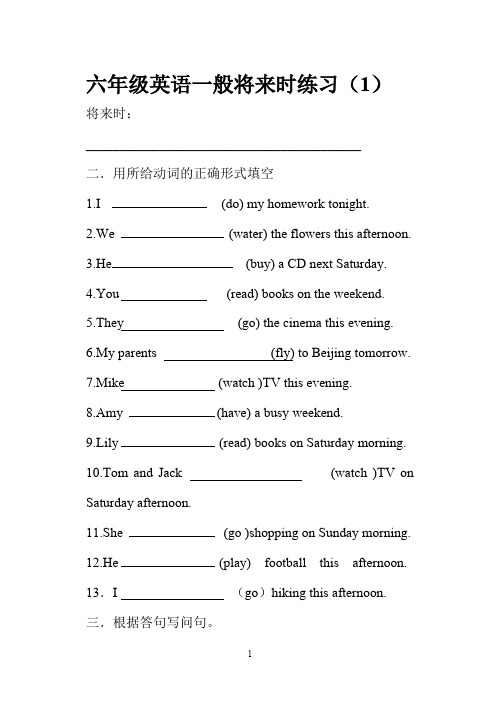
六年级英语一般将来时练习(1)将来时;_________________________________________二.用所给动词的正确形式填空1.I (do) my homework tonight.2.We (water) the flowers this afternoon.3.He (buy) a CD next Saturday.4.You (read) books on the weekend.5.They (go) the cinema this evening.6.My parents (fly) to Beijing tomorrow.7.Mike (watch )TV this evening.8.Amy (have) a busy weekend.9.Lily (read) books on Saturday morning.10.Tom and Jack (watch )TV on Saturday afternoon.11.She (go )shopping on Sunday morning.12.He (play) football this afternoon. 13.I (go)hiking this afternoon.三.根据答句写问句。
1. ?I am going to visit my grandparents this weekend.2. ? He is going to the school tomorrow.3. ? They are going to the library.4. ? we are going to plant trees this weekend.5. ? Mike is going to watch TV this evening.6. ? Liu Yun is going to read books this Saturday.7. ? John is going to the theme park this weekend.8. ? She is going next Tuesday.9. ? Sarah is going to be an English teacher one day.四、划线部分提问(常用疑问词:what, where, when, how, who)1.A:___________________________________________ B: I’m going to visit my grandparents this weekend.2.A:_________________________________________B: I’m going to the bookstore this afternoon.3.A:________________________________________ B: My father is going to Beijing with me.4.A:___________________________________________ B: He’s going to plant trees this weekend.5:A:___________________________________________ B: I’m going to the park at 3 o’clock.6.A:___________________________________________ B: My sister is going to visit the Great Wall next year.7.A:___________________________________________ B:They’re going to the zoo tomorrow.8.A:___________________________________________ B: Tom and John are going to take a trip this weekend.9A:___________________________________________ B:They are going to Shanghai by plane.10.A:___________________________________________? B:she is going to buy a book on the weekend11.A:___________________________________________?B:she is going to buy a book on the weekend 12..A:_____________________________B:We are going to take a trip tomorrow.13.A:________________________________B: Sarah is going to buy a comic book .14.A:________________________________.B: They are going to the cinema this evening.15.A: __________________________________B: Mike is going to the park next week.16.A: __________________________________B: I’m going to the zoo by bike.17.A: _________________________________B: Yes, I am going to read books tonight.18.A: _________________________________B: she is going to play basketball after school.19.A:__________________________________B: I go there on foot.五.根据答句写问句1.A:____________________________________________? B:I’m going to visit my grandparents on the weekend2.A:____________________________________________? B:We are going to go hiking this afternoon.3.A:____________________________________________? B:Mike is going to watch TV this evening.4.A:____________________________________________? B:Liu Yun is going to read books this Saturday.5.A:____________________________________________? B:They are going to take a trip next week.6.A:____________________________________________? B: I’m going to the bookstore tomorrow.7.A:____________________________________________? B: We are going to the cinema this evening.8.A:____________________________________________? B: John is going to the theme park this weekend.9.A:____________________________________________? B: They are going to the Great Wall next month.10.A:__________________________________________? B:I’m going at 2:30.11.A:_________________________________________ ?B:I am going to visit my grandparents this weekend.12.A:_________________________________________? B:He is going to the cinema this afternoon.13.A:________________________________________? B:She is going next Tuesday.14.A:_________________________________________? B:They are going to Shanghai by plane.15.A:_________________________________________? B:Mike and Amy are going to the Great Wall this weekend.16.A:_________________________________________? B:She wants to be a science teacher in the future.17.A:_________________________________________? B:Sarah is going to be an English teacher one day.18.A:___________________________________________?B:Mary is going at 8:10.19.A:___________________________________________?B:They are going at 9:25.20.A:___________________________________________?B:I’m going to the hospital by bus.21.A:________________________________________?B: We are going to the post office on foot.22.A:________________________________________?B:Amy is going to the library by bike.23.A:________________________________________?B: They are going to the shoe store by car.24.A:________________________________________?B:Yes.I’m going to the hospital by bus.25.A:________________________________________?B:No.We are going to the post office on foot.26.A:_________________________________________B:Yes.Amy is going to the library by bike.27.A:________________________________________?B:No.They are going to the shoe store by car.六、短文填空。
广州小学英语三至六年级课文主要知识点汇总

三年级(上册)Module 1: Greetings 26个字母;打招呼用语Module 2:My BodyModule 3: StationeryModule 4: ColoursModule 5: TransportModule 6: Numbers and shapes四年级 (上册)Module 1:Clothes1.询问价格2.衣物类单词、数词的记忆Module 2: PeopleModule 3: Occupations(职业)1.What do you want to be want you grow up?2.What does he do?Module 4: People who help us情态动词的用法Module 5:Time for/toModule 6: Days of the week1.星期/疑问词 at+时间, on+星期, in+月份/季节四年级(下册)Module 1:Age How old…? Module 2:Activities1.现在进行时Module 3:SportsModule 4:Entertainment1、like doing2、一般现在时态Module 5:Food and drinks1.Would you like some……?2.一般现在时态Module 6:shopping五年级(上册)Module 1: Routines and dates1.一般现在时态2.序数词、月份和季节Module 2: Abilities1.情态动词“Can”的用法Module 3: Plants1.植物的名称2.Can 的理解和运用3.一般将来时和现在进行时Module 4:Travel1.be going to2.用“a quarter, half, past, to”来表达时间Module 5:Zoo animals1.Do you like……?2.Would you like to do…?3.Don’t….4.现在进行时态Module 6:Directions1.Can you tell me the way to…,please?2.Turn right/left. Go straight ahead五年级(下册)Module 1: Our life1.一般现在时态 am/pm2.情态动词“may,should”;比较级Module 2: Seeing a doctor1.It’s time to….2.It’s time for….3.be late for.Module 3:Our school and Our class1.形容词的比较级Module 4:Wild Animals1.形容词的最高级Module 5:Eating Habits1.事物名称2.prefer./like…bestModule 6: Weather1.比较级2.季节六年级(上册)Module 1: Plans1.一般将来时:be going to2.What are you going to? I'm going to……. Module 2: Cities1.国家名称、首都。
完整广东开心英语小学六年级上语法知识Gogo开心学英语版
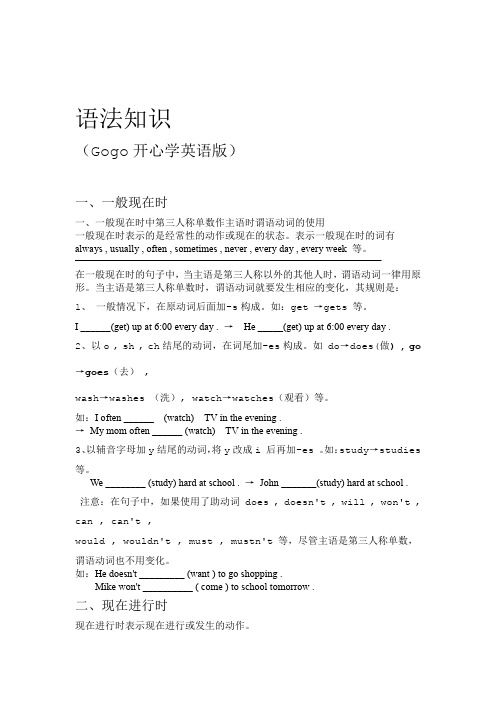
语法知识(Gogo开心学英语版)一、一般现在时一、一般现在时中第三人称单数作主语时谓语动词的使用一般现在时表示的是经常性的动作或现在的状态。
表示一般现在时的词有always , usually , often , sometimes , never , every day , every week 等。
在一般现在时的句子中,当主语是第三人称以外的其他人时,谓语动词一律用原形。
当主语是第三人称单数时,谓语动词就要发生相应的变化,其规则是:1、一般情况下,在原动词后面加-s构成。
如:get →gets 等。
I ______(get) up at 6:00 every day . →He _____(get) up at 6:00 every day .2、以o , sh , ch结尾的动词,在词尾加-es构成。
如 do→does(做) , go →goes(去) ,wash→washes (洗), watch→watches(观看)等。
如:I often ______ (watch) TV in the evening .→My mom often ______ (watch) TV in the evening .3、以辅音字母加y结尾的动词,将y改成i 后再加-es 。
如:study→studies等。
We ________ (study) hard at school . →John _______(study) hard at school .注意:在句子中,如果使用了助动词 does , doesn't , will , won't , can , can't ,would , wouldn't , must , mustn't 等,尽管主语是第三人称单数,谓语动词也不用变化。
如:He doesn't _________ (want ) to go shopping .Mike won't __________ ( come ) to school tomorrow .二、现在进行时现在进行时表示现在进行或发生的动作。
一般将来时(讲义)教科版(广州)英语六年级下册

2023-2024学年五升六英语第十一讲:一般将来时专题专项提升(教科版)一、一般将来时1.一般将来时的定义,时间标志词和结构我会观察:找出句子中的时间标志词。
(1) Ao Bing will have a birthday party next week. ____________________(2) Ne Zha is going to buy a gift for Ao Bing tomorrow. ____________________(3) They will meet in four days. ____________________(4) Ne Zha will play football this afternoon. ____________________(5) Ne Zha and Ao Bing will visit China in 2030. ____________________(6) There will be a birthday party next Sunday. ____________________(7) There is going to be a birthday party next Sunday. ____________________我会发现:1. 一般将来时的定义:表示__________发生的动作或情况。
2. 一般将来时的时间标志词:(1) __________ 型。
如:tomorrow morning, the day after tomorrow(2) __________ 型。
如:next month, next week, next year(3) in + __________。
如:in 2090, in 2030(4) “ __________ +时间”型。
如:this year, this month(注意“this+时间”也可能是表示过去的时间,要看具体情况)5) 其他:tonight, soon, from now on, in the future, later3. 一般将来时的结构:(1) 主语+ _______________ + 动词___________ (形式)(2) 主语+ _______________ + 动词___________ (形式)4. there be的一般将来时结构:(1) There + _______________ + 动词___________ (形式)(2) There + _______________ + 动词___________ (形式)小练笔:1. His daughter __________ __________ (travel) in 2032.= His daughter __________ __________ __________ __________ (travel) in 2032.2. He is going to Beijing _________.A. nowB. yesterdayC. next weekD. 20083. --- How soon will you come back?--- __________.A. This morningB. The day before yesterdayC. NowD. The day after tomorrow4. My mother __________ me a nice present on my next birthday.A. will givesB. will giveC. givesD. give5. There __________ a football match this weekend. I can't wait!A. isB. haveC. will beD. is going to have6. 用词的适当形式填空。
四大时态复习(讲义)教科版(广州)英语六年级下册

小学英语四大时态复习教学目标:1. 掌握四大时态的结构和用法3. 以辅音字母+y结尾的单词,变y为i,再加es。
butterflybutterfliesfamilyfamilies4. 以o结尾的单词:有生命加stomatotomatoespotatopotatoes无生命加espianopianosphotophotoszoozoosradioradios时态专题综合训练一、单项选择1. John _____ football.A. likes playingB. likes playC. like play2. Does your mother _____ football?A. likeB. likesC. like play3. They usually _____ TV in the evening.A. watchB. will watchC. are watching4. —What do you usually do on the weekend?—I often ____.A. do my homeworkB. did my homeworkC. doing my homework5. I don’t like _____ thrillers(恐怖片)______ playing baseball.A. watching; orB. watching; andC. to watch; or6. Bob often _____ to school.A. walkB. walksC. walked7. My pen ______ on my desk ten minutes ago. But it _____ there now.A. is; isn’tB. was; isn’tC. is; is8. Mike is _____ after his classmates.A. runsB. runingC. running9. Be quiet! The babies ________.A. sleepB. are sleepingC. slept10.______ he _____ his homework yesterday?A. Does; doB. Did; didC. Did; do11. —What did you do last weekend.—I ______.A. go swimmingB. did my homeworkC. went swim12. —What’s your hobby?—_____ is my hobby.A. Collecting stampsB. Collect stampsC. Stamps13. —Where were you just now?—I _____ at school.A. isB. wasC. were14. ______ he ______ his grandparents last month?A. Did; visitedB. Did; visitC. Do; visited15. Last week, we _____ a _____ race.A. hard; runningB. have; runningC. had; running16. I______ to the park last week.A. goB. wentC. going17. If I _____ you tomorrow, I will give you the receipt(收据)。
小学英语六年级一般将来时复习

一、选择正确的代词填空。
1. Open the door for __________ (I, me) please.2. Catch __________ (he, him)! He’s a thief.3.I love Mickey very much. What about __________ (you, your)?4.__________ (They, Them) are my classmates.5.Look at __________ (they, them). They are drawing pictures.6.Are these oranges __________ (their, theirs)?7.The blue bike is __________ (her, his), not mine.8.Look at the car. __________ (I t’s, Its) colour is black.9.Your bags are green __________ (their, theirs) are yellow.10.Their school is in the country. __________ (Our, Ours) school is in the city.练习:填空。
1. 我打算明天和朋友去野炊。
I_____ _______ _________ have a picnic with my friends.I ________ have a picnic with my friends.2. 下个星期一你打算去干嘛? 我想去打篮球。
What ________ ________ _________ _________ _________ next Monday? I _______ ______ _____ play basketball.What _________ you do next Monday? I ________ play basketball.3. 你妈妈这个周末去购物吗?是,她要去买一些水果。
用一般将来时写我的周末英语作文六年级

用一般将来时写我的周末英语作文六年级English: This weekend, I will have a fun and exciting time. On Saturday morning, I plan to go to the park with my family for a picnic. We will bring delicious sandwiches, fruit, and drinks to enjoy under the warm sun. In the afternoon, I have a soccer game with my friends, and I am looking forward to scoring a goal. On Sunday, I will spend the day at home with my parents. We will watch a movie together and maybe bake some cookies. I can't wait for the weekend to arrive!
中文翻译: 这个周末,我将度过一个有趣而令人兴奋的时光。
周六早上,我计划和家人一起去公园野餐。
我们会带着美味的三明治、水果和饮料,在温暖的阳光下享受美好时光。
下午,我和朋友有一个足球比赛,我期待着能进球。
周日,我将和父母一起待在家里。
我们会一起看电影,也许还会烤一些饼干。
我迫不及待地等待周末的到来!。
小学英语六年级下册专题复习——一般将来时(课件)

Is Piggy going to build a new house?
Yes, he is.
He is going to build a new house.
What is Piggy going to do ?
He is going to build a roof, make a window, build a door, find some food and invite Peggy to his house.
house.
smar
helpful
t
What is Piggy like?
hard-
...
working
Is Peggy going to build a roof?
No, she isn't. She isn't going to build a roof.
Is Peggy going to make a window?
No, she isn't.
She isn't going to make a window.
Is Peggy going to build a door?
No, she isn't.
Sheisn't going tobuild a door.
Is Peggy going to find any food for winter?
When will she build?
Where will she build ?
How will she build?
Piggy and Peggy live in the forest. Piggy is going build a new hsoommutasoekeefionaowtdhiefnodfroowrweinsattnetdor dabanuyd.iliHdinasevdgitooeoiPnr.egTgthgoeynbtohuehilidstiaoshrogouoosifne. .Hget_ois_f__gin_o_di_n_g
六年级英语一般将来时句子及翻译

六年级英语一般将来时句子及翻译1、我明天要去上学。
I will go yo school tomorrow。
2、明天谁将要来那里? Who will e here tomorrow?3、下周会发生什么? What will happen in the following week?4、下次你将在哪里打篮球?Where will you play basketball next time?5、这封信明天将寄出去。
The letter will be sent tomorrow。
6、这天下午我们准备开班会。
We are going to have a class meeting this afternoon。
7、我将回答那个问题。
The question will be answered by me。
8、他不会那样做的。
He wont do that。
8、他不会那样做的。
He wont do that。
9、王教授稍后将会给我们展现。
Professor Wang will give us a presentation later。
10、我将过去帮你。
Im going to help you。
11、明天早.上我要去买些东西。
I am going to buy something tomorrow morning。
12、Look at the black clouds。
Its going to rain。
看那些乌云,快要下雨了。
13、我将去买一本书。
Im going to buy a book.14、九月份我将会返校。
I will e back to school in September。
15、你会明白这个问题的。
You will understand the quest ion。
16、明天我要去北京。
I will go to BeiJing tomorrow。
17、她准备这天下午去探望王先生。
She is going to see Mr。
小学六年级英语知识点一般将来时

小学六年级英语知识点一般将来时表示将来将要发生的动作,经常和tomorrow, next year, the day after tomorrow, the year after the next, in fi*e hours' time, etc. 表示将来的词联用。
结构:主语+助动词will+动词原形I will go to America tomorrow.The pilot will fly to Japan the month after the next.Jack will mo*e into his new house tomorrow morning.★变疑问句将助动词移到句首Will you go to America tomorrow?Will the pilot fly to Japan the month after the next?Will Jack mo*e into his new house tomorrow morning?★变否定句在助动词后面加notI will not go to America tomorrow.The pilot will not fly to Japan the month after the next. Jack will not mo*e into his new house tomorrow morning.★肯定回答及否定回答Yes, I will. / No, I will not.Yes, he/she will. / No, he/she will not.Yes, he will. / No, he will not.★特殊疑问句What will you do?网络搜集整理,仅供参考。
小学六年级英语一般过去时练习题及小学六年级英语一般将来时练习
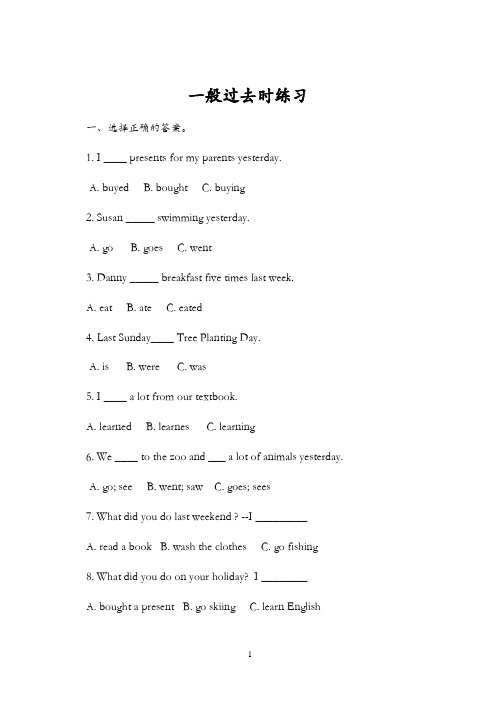
一般过去时练习一、选择正确的答案。
1. I ____ presents for my parents yesterday.A. buyedB. boughtC. buying2. Susan _____ swimming yesterday.A. goB. goesC. went3. Danny _____ breakfast five times last week.A. eatB. ateC. eated4. Last Sunday____ Tree Planting Day.A. isB. wereC. was5. I ____ a lot from our textbook.A. learnedB. learnesC. learning6. We ____ to the zoo and ___ a lot of animals yesterday.A. go; seeB. went; sawC. goes; sees7. What did you do last weekend ? --I _________A. read a bookB. wash the clothesC. go fishing8. What did you do on your holiday? I ________A. bought a presentB. go skiingC. learn English9. What did he _____ yesterday? He ____ his homework.A. did; didB. do; didC. do; do10. Yesterday my presents and I ____ our house.A. were cleaningB. cleanedC. are going to clean11. What _____ to trees in the different season?A. happenB. happensC. happened12. Last summer. I ____ in the lake and played on the beach. A. swimB. swamC. will swim13. Did you eat good food in China? ______.A. Yes, I doB. No, I didn’tC. No, I did14. We played basketball _____.A. sometimesB. on SaturdaysC. last Saturday( ) 1. She watered the flowers ________.A .tomorrowB .sometimesC .yesterday morning( ) 2.What ____ Mike do last weekend ?A doB doesC did( ) 3. I ___ my room last Sunday.A cleanedB cleanC am cleaning( ) 4. I often help my mother _____ housework.A doesB didC do( ) 5. _____ you _____ TV last night .A Do, watchB Did, watchC Did, watched( ) 6.---Did your father write an e-mail yesterday ?A Yes, he did.B Yes, he doesC No, he don’t( ) 7.They _____ on a trip in February ,2007.A are goingB goingC went( ) 8.We’re going to _____ mountains tomorrowA climbB climbedC climbing( ) 1. She watered the flowers ________.A tomorrowB sometimesC yesterday morning( ) 2.What ____ Mike do last weekend ? A do B does C did ( ) 3. I ___ my room last Sunday. A cleaned B clean C am cleaning ( ) 5. _____ you _____ TV last night .A Do, watchB Did, watchC Did, watched( ) 6.---Did your father write an e-mail yesterday ?A Yes, he did.B Yes, he doesC No, he don’t( ) 7.They _____ on a trip in February ,2007.A are goingB goingC went( ) 9. ____ he ____ football two days ago?A Does , playB Did , playedC Did , play二、改错题(请改正每个句子中的一个错误) 1.How is Jane yesterday?_____________________________________ 2.He go to school by bus last week.________________________________3.He goes home at 6:00 last month.________________________________4.Did you saw him just now ?______________________________5.He wait for you three hours ago._________________________________6. I readed an English book last week_________________________________三.改写句子:1、Lucy did her homework at home.(改否定句)Lucy ________ _______ her homework at home.2、He found some meat in the fridge(冰箱).(变一般疑问句)___________ he __________ ___________ meat in the fridge?3、There was some orange in the cup.(变一般疑问句)_______ there _______ orange in the cup?4. Frank read an interesting book about history. (一般疑问句)_______ Frank _______ an interesting book about history?5. Why not go out for a walk? (同义句)_______ ________ ________ out for a walk?四.写出下列动词的过去式is\am_________ fly_______ plant________ are ________ drink_________ play_______ go________ make ________ does_________ dance________ worry________ ask _____ taste_________ eat__________ draw________ put ______throw________ kick_________ pass_______ do ________visit ---- water---- live---- watch----play--- want---- need---- work----stay---- study---- listen---- stop----shop---- like---- hate---- call ----第一类Amy is fat now.Amy is very thin two years ago.The dog is old nowThe dog was young three years ago.The water is dirty now.The water was clean last year.第二类They were students last yearThey were happy just nowWe were in the classroom five minutes ago They were in America in 2013.第三类I go to school every dayI went to school yesterdayJohn visits the museums on FridaysJohn visited the museums last summerTim buys a book in the morningTim bought a book last Sunday一般现在时用法:描述过去某时刻发生的动作或所处的状态句型变换J将下列句子变为否定句、一般疑问句第一类:I was in the market yesterdayYou were a studentThe cat was illI was unhappy第二类We had 4 lessonsI slept just nowI had a dream yesterdayI went to school last weekI became an alien 20 years ago.小结:助动词did本领大,否定疑问都靠它Did还是照妖镜,动词见它现原形六年级英语一般将来时练习(1)将来时;_________________________________________ 二.用所给动词的正确形式填空1.I (do) my homework tonight.2.We (water) the flowers this afternoon.3.He (buy) a CD next Saturday.4.You (read) books on the weekend.5.They (go) the cinema this evening.6.My parents (fly) to Beijing tomorrow.7.Mike (watch )TV this evening.8.Amy (have) a busy weekend.9.Lily (read) books on Saturday morning.10.Tom and Jack (watch )TV on Saturday afternoon.11.She (go )shopping on Sunday morning.12.He (play) football this afternoon. 13.I (go)hiking this afternoon. 三.根据答句写问句。
- 1、下载文档前请自行甄别文档内容的完整性,平台不提供额外的编辑、内容补充、找答案等附加服务。
- 2、"仅部分预览"的文档,不可在线预览部分如存在完整性等问题,可反馈申请退款(可完整预览的文档不适用该条件!)。
- 3、如文档侵犯您的权益,请联系客服反馈,我们会尽快为您处理(人工客服工作时间:9:00-18:30)。
教学目标
复习并掌握一般将来时的结构和用法。
重点难点
练习与练习讲评。
一般将来时
一般将来时:将要发生的事情或者计划要做的事情,用一般将来时。一般将来时的句子中经常有表示将来时间的短语tomorrow,next year等。
一般将来时的构成:be going to +动词原形
一般将来时的另一种结构:will/ shall+动词原形
构成:
(物(第(1)第一人称:I/we)+shall+动词原形,例如:
We / I shall go to park next day.
否定形式:+shall not +动词原形,例如:
We / Ishall not go to parknext day.
提问:Shall…+动词原形…?,例如:
Shall we go to the park next day?
Yes, I / we / he / she / they / it will.
No, I / we / he / she / they / it won’t.
三.实战训练
(一)用所给的动词的适当形式填空。(每个空只填一个词)。
1.Tomorrow, my family_____________(have)a picnic, We ________ _______
(2)人/物+be going to +动词原形,例如:
Iam going to goboating next week.
My motheris going to cooka big meal next Sunday.
My grandparentsare going to cleantheir house tomorrow.
否定形式:…will not +动词原形
I / We / You / He / She / They / It / will notwash my bag tomorrow.
提问:will+动词原形…?
Will you he / she / they / itwash my bag tomorrow?
Yes, they __________. They always ___________(go) sightseeing on Sunday.
7.There_____________________(be)a party at our school tomorrow. And they
____________ __________(have) great fun, I think.
_________ __________(buy) something to___________(eat) there.
10.Look at those workers. They_____________________(plant)trees on the hill. The
day after tomorrow, they ___________ ___________ (plant) trees near the river.
(go)to the park to _________(go) boating.
2. ___________you _________ _________ (free) the day after tomorrow?
Yes, I___________.
3.Our father___________(go)to work on foot every day. But he _________ _________(go) to work by bike tomorrow.
4.Listen, the children______________(sing)in the music room. And they ________
________ (dance) next week.
5. ___________you ________ _________ ________(visit)the Great Wall next
8. It ______ _______(be) a fine day tomorrow.
9.Tomorrow Miss Wang__________________ __________________(leave) for
New Zealand. She ___________ ___________(go) there by plane. Look, she
Are your grandparentsgoing to clean their house tomorrow?
Yes, they are.No, they aren’t.
)—(3)人/物(所有人称:)+will+动词原形,例如:
I / We / You / He / She / They / It / willwash my bag tomorrow.
注意时态特征词(tomorrow, tomorrow+时间, next+时间, next week, next month, next yea Nhomakorabea)的作用。
二.具体解释
1.标识词、特征词:tomorrow、tomorrow+时间:tomorrow evening;
next+时间next week,next month,next year
提问:Am / Is / Are…+going to +动词原形…?,例如:
Are yougoing to go boating next week?
Yes, I am.No, I’m not.
Is your mother going to cook a big meal next Sunday?
Yes, she is.No, she isn’t.
summer holiday? No, we _________. But we _________ ________ _________ __________(swim) in the swimming pool.
6.___________the pupils __________(go) sightseeing next Sunday?
